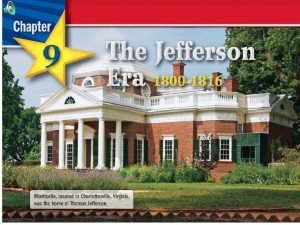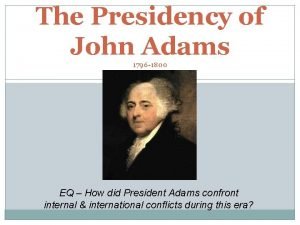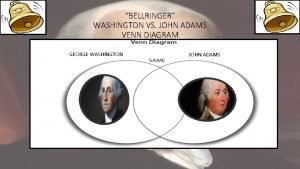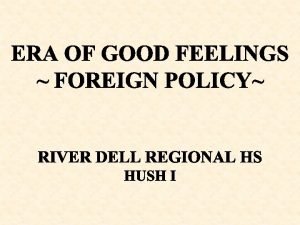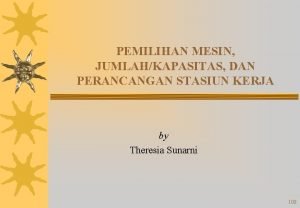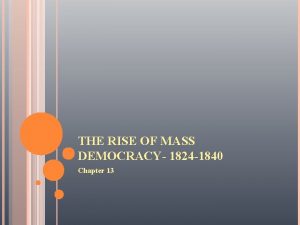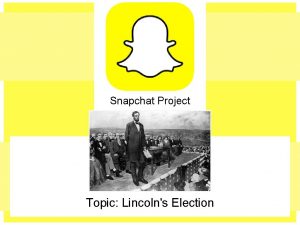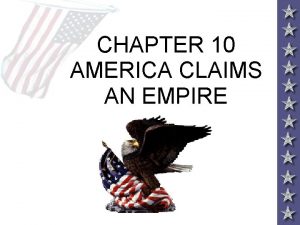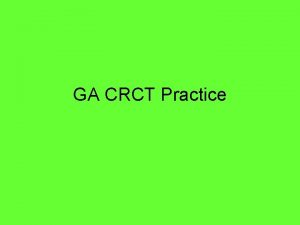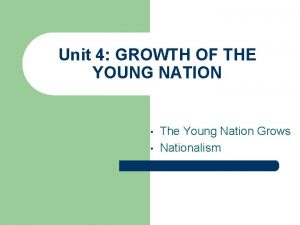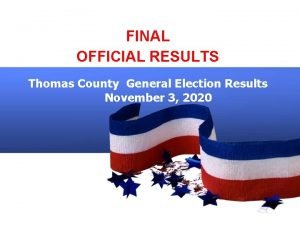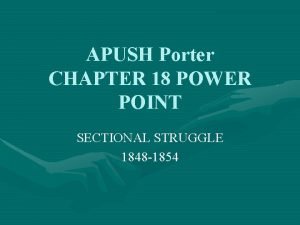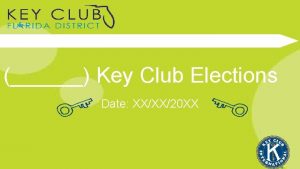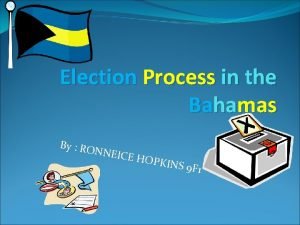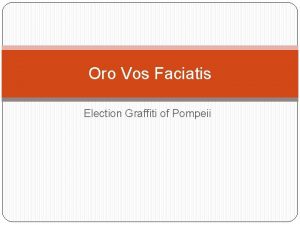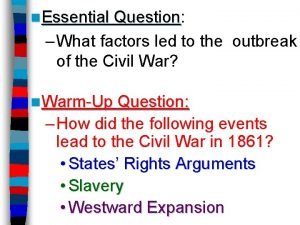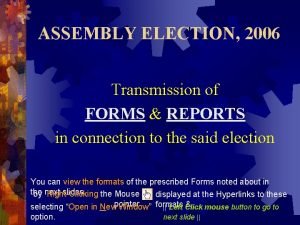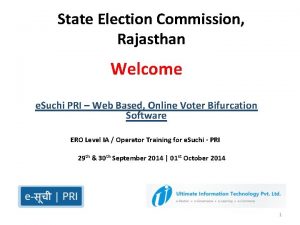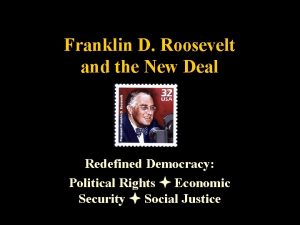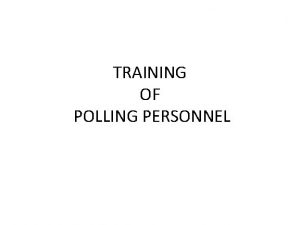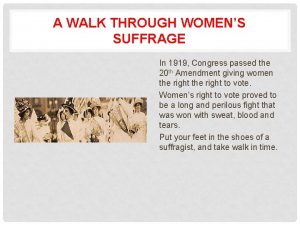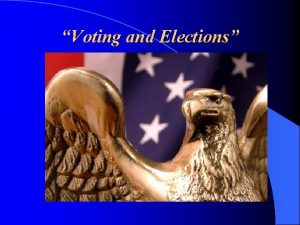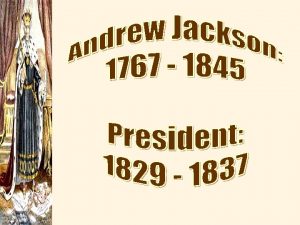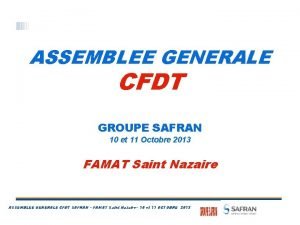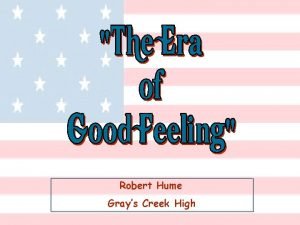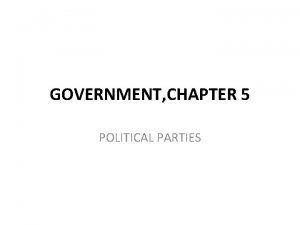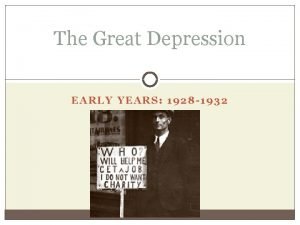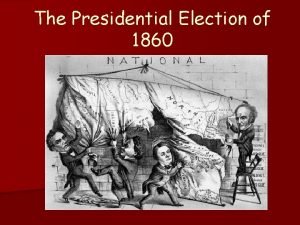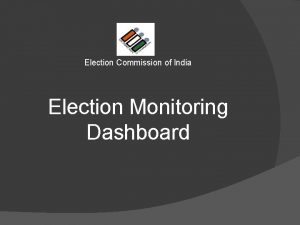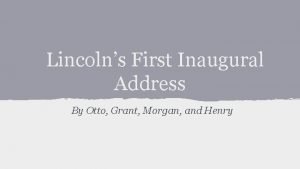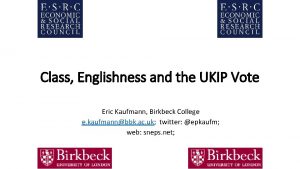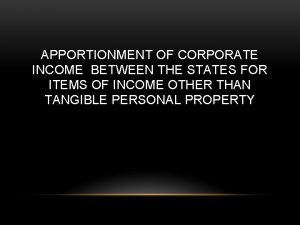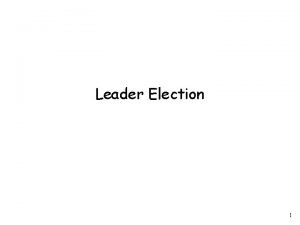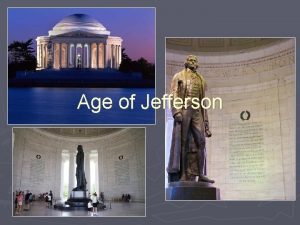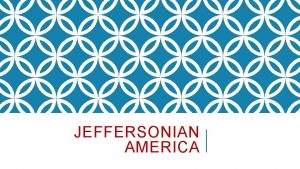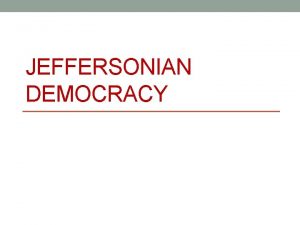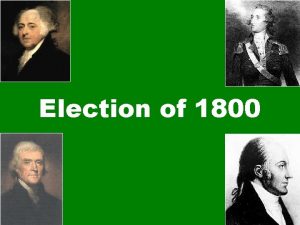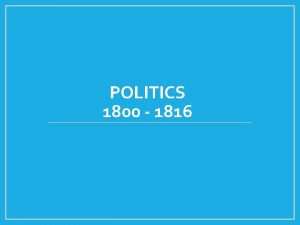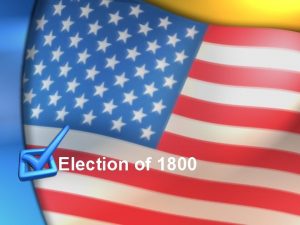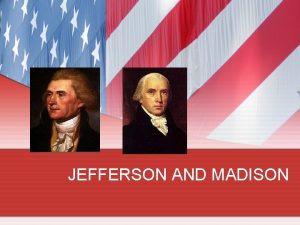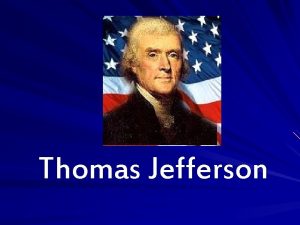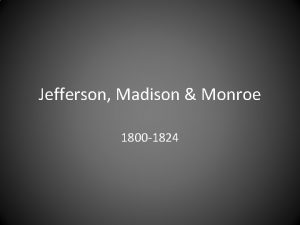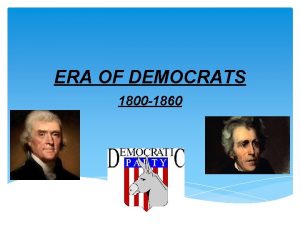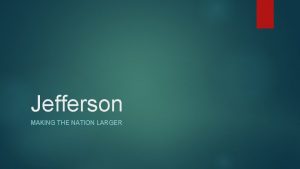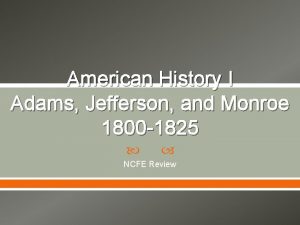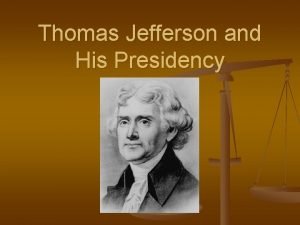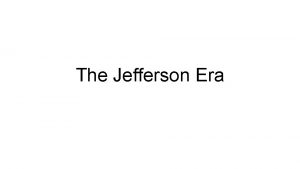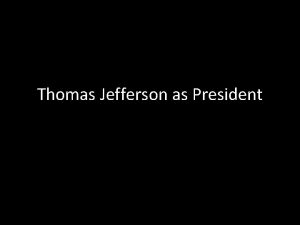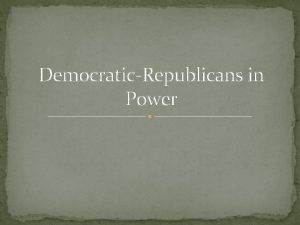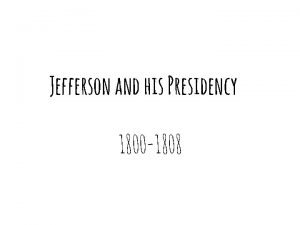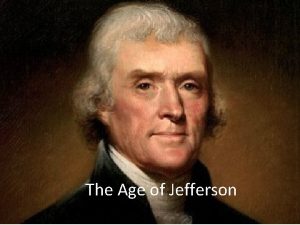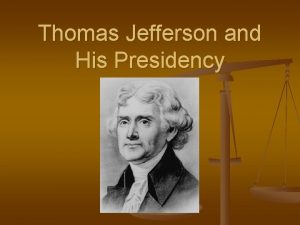The Election of 1800 Adams vs Jefferson Adams





























































- Slides: 61

The Election of 1800 • Adams vs. Jefferson Adams and the Federalists went on the defensive with a mudslinging campaign against Jefferson. • Jefferson still won with 73 electoral votes to Adams’ 65. • He was criticized by Northern states as an embodiment of “the slave power that southern states wielded” since his victory was all but assured by the 3/5 Clause. •

The Revolution of 1800 • The governing party had changed: Federalists Dem-Reps. • Jefferson had a goal to return to the same spirit that had created the American Revolution. • He did this through moderation though; he knew how he was viewed, especially after the campaign, and wanted to make sure he could appeal to everyone.

Things Jefferson Did: • Naturalization Act of 1802 (pg 210) • Repealed the excise tax (210) • Kept the National Bank, payment of debts (210) • Attempted to impeach a Supreme Court justice (211) • Fought some pirates (212 -213) • The Louisiana Purchase (213 -214) • Lewis & Clark Expedition (215) • The Embargo of 1807 (218)

Marbury v. Madison • The Judiciary Act of 1801 was passed in Adams’ last days as president, resulting in the appointment of several “midnight judges” who were appointed by Adams on his last day in office. • The newly elected Dem-Rep Congress did their best to repeal the act and replace the judges appointed by Adams. • This meant that the appointment papers for the judges appointed by Adams did not get delivered.

Marbury v. Madison • This did not sit well with William Marbury, who was supposed to be a new federal judge in DC, and he filed a lawsuit against Secretary of State James Madison who should have been tasked with delivering the appointments. • The case was presented to the Supreme Court, who needed to make decisions on several issues, including whether or not they could force Madison to give Marbury his job and how this issue should be addressed using the Constitution.

Marbury v. Madison • The Court ultimately decided: The Judiciary Act of 1801 now supplemented the Judiciary Act of 1789, making Marbury’s basis for his case obsolete. • In terms of the Constitution and constitutional matters, the Supreme Court has the final say. This is called judicial review. • Finally, no, they could not force Madison to deliver the appointment so Marbury did not get the job. •

Jefferson vs. the Federalists • The Supreme Court was the only remaining part of the Federalist government. • Marbury v. Madison represented an indirect conflict between the Dem-Reps (Madison) and the Federalists (Marbury). Chief Justice John Marshall, however, made the case a win for the Court rather than anyone else. • Jefferson and the Dem-Reps then went after Supreme Court Justice Samuel Chase, leveling impeachment charges against him in 1804. • While the House brought charges, the Senate could not muster enough votes to actually remove Chase from office.

Jefferson vs. the Pirates • Jefferson reduced the size of the military, favoring the tactic of “peaceful coercion” over physical violence and wars. • Jefferson also stopped payments for the protection of American ships from the pirates of North Africa. The pirates unofficially declared war on the US, and Jefferson sent a very reduced Navy to Tripoli. • After four years of fighting in the Tripolitan War, a treaty was secured in 1805, which granted $600, 000 to the pirates in return for captured sailors and ships. •

Jefferson vs. France • In 1800, leader of France Napoleon made a deal with the king of Spain to cede most of the Louisiana Territory, along with New Orleans to France, unbeknownst to the US. • This was only confirmed to the US in 1802, when some of the rights granted by Spain to the US in Pickney’s Treaty were denied. This angered Western farmers who depended on the Mississippi River for trade purposes. • It also posed a threat to the US, with the farmers threatening to march on New Orleans with their rifles and the megalomaniac ruler of France being in control of a large area so nearby. •

The Louisiana Purchase • Jefferson sent fellow Virginian James Monroe to join Ambassador Robert Livingston in France with instructions to purchase as much territory around New Orleans as they could for $10 million. This also came with the provision that if France turned on the US, they were to leave and begin negotiations for an alliance with Great Britain. • “The day France takes possession of New Orleans, ” Jefferson wrote, “we must marry ourselves to the British fleet and nation. ” •

The Louisiana Purchase • Much to everyone’s surprise though, Napoleon decided to sell the entirety of the Louisiana Territory to the US for $15 million. • Rather than risk an alliance between the US and Britain, Napoleon was more willing to give up the entire territory. • This was prompted by two events: The Haitian Revolution • Reignited conflict between France and Britain •

The Louisiana Purchase • Jefferson was both thrilled and conflicted. Agreeing to the price would mean avoiding conflict with France and an alliance with Britain, and doubling the size of the US allowing for the spread of the American experiment. • However, Jefferson was also quick to note that while the Constitution allowed for the president to make treaties, it did not directly allow him to purchase land, which could make this move unconstitutional. • As we all know, Jefferson ultimately decided the pros outweighed the cons, and purchased the Louisiana Territory. •


Lewis & Clark Expedition • Jefferson sent his personal secretary Meriwether Lewis and army officer William Clark to explore the new territory. • Their journey yielded vast knowledge about the land, people, and animals of the territory resulting in a number of maps, scientific observations, and the possibility of a land route to the Pacific. • This would lead to further exploration of the West, including Colorado, and a greater American claim to the Oregon Territory.


The Notorious Aaron Burr • Despite the long-term promise of riches that Louisiana could bring, the short-term fears were much greater. • • Many feared the US government would not be accepted in the new territory, or lead to entanglements in foreign affairs. Federalist extremists in NY and New England, including Jefferson’s former VP Aaron Burr, plotted to secede from the US. • This plot was exposed to Jefferson by Alexander Hamilton, whom Burr challenged to a duel as a result.

The Notorious Aaron Burr • Burr was part of a similar secessionist plot with the military governor of the LA Territory. Their plot was to split the new west from the US and create a new confederacy that could invade Spanish Mexico. • Jefferson found out about these plans too, causing the military governor to betray Burr by leaving him stranded in Natchez, MS. • Burr was arrested and tried for treason. He was acquitted, and fled to Europe. •

Jefferson vs. Britain and France • Jefferson was re-elected in 1804, but celebration was short-lived thanks to Napoleon’s rekindled battle with Britain. • Despite this renewed conflict, the US maintained neutrality and trade with both countries. Battle of Trafalgar, 1805: Horatio Nelson and the British Navy secure superiority at sea by crushing the French and Spanish fleets. • Battle of Austerlitz (aka, the Battle of Three Emperors), 1805: Napoleon secures supremacy on land by taking out the Austrian and Russian armies. •

Jefferson vs. Britain and France • Britain and France enact laws against each other’s trade. Orders in Council, 1806 -1807: British edicts that worked to close French ports to foreign shipping, unless the vessel first stopped at a British port. • France orders the seizure of all merchant ships entering British ports. • “There was no way to trade with either nation without facing the other’s guns. ” • Also British impressment of American sailors continues. •

The Chesapeake Affair • British naval frigate HMS Leopard hailed the American ship Chesapeake off the coast of Norfolk, VA on June 22, 1807. • The Chesapeake welcomed aboard the Lieutenant from the Leopard who presented the American captain with a search warrant to look for British deserters. • After some discussion, the captain of the Chesapeake refused to allow the search and the Lt. returned to his ship. • The Leopard fired three broadsides into the Chesapeake, killing three crewmen and wounding 18 more.

The Chesapeake Affair • Britain was clearly in the wrong, as later admitted by the government in London. • Americans, including Jefferson, were livid. Many rallied for war against Britain for this and the continued impressment of American sailors, and would have supported a declaration of war by Jefferson…had he actually called for it. • Instead, this event and the Orders in Council marked the beginning of a series of events leading to the War of 1812.

Jefferson vs. Britain and France • Jefferson now had to come up with a way to avenge American honor and teach the British and the French a lesson. The answer became clear upon reflection; both countries depended on the US for food and raw materials. • The Embargo of 1807: Forbade all exports from the US, on any kind of ship. •

The Embargo of 1807 • As it turned out, America felt the effects of the Embargo before either Britain or France. New England ships sat in their harbors with nowhere to go, and piles of unexportable cotton, grain, and tobacco looked like wasted time and money in the South and West. • Illegal trading grew, particularly along the Canadian border where goods could be traded with Britain. • Congress repealed the Embargo in 1809, days before the end of Jefferson’s second term, and replaced it with the very targeted Non-Intercourse Act. • • The Non-Intercourse Act allowed the US to trade with anyone EXCEPT Britain and France.

The Embargo of 1807 • What was the problem with the Embargo? Jefferson had miscalculated. He overestimated both countries’ dependence on US goods: Britain managed to grow enough grain themselves for just long enough to outlast the embargo, and with most Europe under French control, France could just look east instead of west. • This was not helped by revolution-happy Latin America opening ports to take over the trade in America’s place. • • Economic coercion would be the new American “neutrality” until they were finally pulled into war in 1812.

President Madison • James Madison took office as president in March, 1809. • Madison did not have the benefit of party solidarity that Jefferson, or even Adams, had as president. • This meant he often found himself executor “for risky foreign policies not of his own making. ”

Macon’s Bill No. 2 • An economic policy aimed again at Britain and France, which stipulated that whichever country repealed its commercial restriction first, America would restore its embargo against the other. Madison felt this was a sell-out: it blatantly showed Britain and France that the US needed them economically. • Napoleon, however, saw an opportunity to create a blockade against Britain: Britain had implied in the Orders in Council that their trade restrictions would be lifted if French restrictions were also lifted. •

Macon’s Bill No. 2 • Although Madison could see Napoleon’s intent, he accepted the French offer of repeal. This also gave Britain three months to make good on their implied repeal of the Orders in Council, with Madison hoping the British would do so rather than see the US trade almost exclusively with France. • Britain made no move to repeal the Orders, giving Madison no choice but to reinstate the embargo against them. •

The War Hawk Congress • Elections had made the Congress young, sweeping out the older “submission men” and replacing them with “young hot heads” from the South and West, dubbed “war hawks” by the Federalists. • The war hawks hated Britain’s continued mistreatment of America and the “Indian threat” to westward expansion. They were anxious to fight one, the other, or both.

The Battle of Tippecanoe • Off in Indiana, two Shawnee brother were eager to meet the Americans in battle. Tecumseh and his brother, Tenskwatawa (aka The Prophet), had built a Native American confederacy they felt could rival the Americans they were bound to face. • This happened at the Battle of Tippecanoe in 1811: William Henry Harrison, gov. of IN, marched on the brothers’ headquarters. Tenskwatawa retaliated and lost the settlement and much of his respect. • Harrison was deemed a hero, but the whole event drove Tecumseh into an alliance with the British.

The War • The path to war was paved with… • • The Chesapeake Affair The Orders in Council The Embargo of 1807 The Non-Intercourse Act of 1809 Macon’s Bill No. 2 Tecumseh’s War/Battle of Tippecanoe The War Hawk Congress

The War • Madison was pushed into a precarious position. The British were continuing to arm Native Americans against American settlers in the West, cause the war hawks in his own party to call for an invasion of Canada. • International trade with anyone had been made iffy by impressment and backhanded moves by France. • But above all Madison felt that America’s place as a country, and its entire republican experiment, was being invalidated. If America could not fight to protect itself, he reasoned, everything they had done to that point would be discredited, and then what? • • He asked Congress to declare war in June of 1812.

The War • The Congress passed the measure for war 79 to 49 in the House, and 19 to 13 in the Senate. The divisions within the country had been made all the more clear by the vote. • The South and West had voted for the war, as had the larger middle states. • The North, and Federalists in the South, abhorred the conflict, just as they had Jefferson’s sympathies for France. • • It was said that America had two enemies during the War of 1812, old England New England.

The War of 1812 • 1812 -1815 • The US was largely unprepared for war as Jefferson had downsized the military. Anger toward Britain had also subsided around the time Madison asked for a declaration of war. • Britain had been fighting in the Napoleonic Wars for years, and were already seasoned to fight again. •

The War of 1812 • The major battleground of the war was the Great Lakes. America first decided to fight the British in Canada were they were weaker. • The British, however, quickly captured several American forts along the Great Lakes and in the West. •


The War of 1812 • After failing to invade Canada, the US made an…interesting move to fight the British at sea. • The ships that America did have were well-fortified with adequate arms, and thicker sides.

The War of 1812 • Battle of Lake Erie (1813): Commanded by Oliver Perry (US), who had recently set up a new fleet of ships on the Lakes. They looked very similar to the East Coast frigates but had green sides. • Perry and his fleet were able to capture or sink six British ships, resulting in an American victory that shifted morale during the war. •

The War of 1812 • Battle of the Thames (1813) After defeat at Lake Erie and Fort Detroit, the British were forced inland, where they were met by William Henry Harrison. • This would be a two-fold battle for Harrison who first overran the British, forcing a retreat. The second stage was against Tecumseh’s Confederacy, who had allied with the British after the Battle of Tippecanoe. • This would be second major American victory in six months. •

The War of 1812 • Britain regrouped after the capture and exile of Napoleon in Europe, which allowed them to turn their focus to America. They made a direct invasion of the nation’s capital, the first America had truly experienced, in August of 1814. This resulted in the burning of Washington. • The occupation of Washington lasted 26 hours, before the British moved toward Baltimore. •

The War of 1812 • Battle of New Orleans (1815) Leader of American forces in the West, Andrew Jackson, was quickly placed in charge of retaliation once it was discovered another British force was headed south. • Jackson’s force of 7000 was a rag-tag bunch of soldiers, sailors, former slaves, and thieves, who would be somewhat evenly matched against the 8000 British headed their way. • This decisive battle was over quickly, resulting in American victory and the worst British defeat of the war. • The British lost 2000 troops within the first half hour. • The British responded by reinforcing their blockade around the East Coast. •

The War Ends • Treaty of Ghent (1814): formal armistice between Britain and the US that brought the war to a halt. Negotiations had started at the behest of Tsar Alexander I of Russia in 1814. • As it appear they would be victorious, the British asked for heavy concessions from the US, which adamantly refused by US representatives John Quincy Adams and Henry Clay. • Terms were finally agreed upon in December of 1814, BEFORE the Battle of New Orleans; Britain had become exhausted by war and was preoccupied by the Congress of Vienna. •

Hartford Convention • Before the Treaty of Ghent and the Battle of New Orleans, the Federalists in New England, fed up with the war, set up the Hartford Convention. At the convention, delegates from MA, RI, and CT wrote up a list of demands for a US government they thought would be faltering. • Included in their demands were • Financial compensation for trade • A proposal for a constitutional amendment that would require a 2/3 majority vote in Congress before an embargo could be enacted, a state could be admitted, or war could be declared • Abolishment of the 3/5 Clause •

Hartford Convention • When messengers arrived in Washington, it was just in time to hear the news of victory in New Orleans. Their demands now seemed “petty at best and treasonous at worst. ” • They were never formally introduced to Congress. • This does mean the secessionist thought would again spring up in New England, and was more dangerous here than anywhere leading into the 1840 s. •

Impact of the War • Globally unimportant, but extremely important to the US. America had earned its respect as an independent nation, if not for winning then for standing up for themselves against the major powers of the day. • A new military elite had emerged: Jackson, Harrison, Perry. They created a strong enough military to promote less scorn for American ambassadors abroad. • Sectionalism was dealt a blow: most of America had pulled together for the war, and those who hadn’t (*cough* New England *cough*), were quickly losing respect and prestige. • America gained a greater sense of self-reliance. Domestic manufacturing had emerged and supported the US through the war, and were encouraged to continue this path. •

Impact of the War Rush-Bagot Agreement (1818): disarmed the Great Lakes to a vast extent. • America would be free of conflict started by Europe long enough to look West. • A new sense of American nationalism/patriotism emerged, and encouraged all things American, including literature, artwork, textbooks, and more. •

American Manufacturing • During the war, America became more self-reliant when it came to manufacturing goods. They had previously gotten most of their finished products from Europe. • After the war, the British were hoping to re-create that dependence. However, America was already putting things in place to prevent this. • Tariff of 1816: enacted for protection rather than revenue, created a 20 -25% on imports.

Henry Clay’s American System • Supplemented the Tariff of 1816. • Included three parts in the hopes of promoting American manufacturing and domestic trade: A strong banking system • Protective tariffs • Improved internal transportation •

Henry Clay’s American System • Clay reasoned that with a stronger banking system, more people could easily obtain credit to buy land or equipment, or start a business. • By instituting protective tariffs, he said, American businesses and manufacturers would have greater chances of succeeding because imported products would be too expensive. • He said that the money saved and/or earned with the protective tariffs should go to improving domestic transportation. • Clay argued that “these new arteries of transportation would flow foodstuffs and raw materials from the South and West to the North and East. In exchange a stream of manufactured goods would flow in the return direction, knitting the country together economically and politically. ”

Transportation • This call for improved transportation struck a cord with many. Part of the reason the American invasion of Canada had failed was because there was no direct route to travel and carry supplies. • The West was all but begging to be better connected with the rest of the country. •

Transportation • Securing federal funding for transportation was more difficult than originally imagined though. • • Re-elected President Madison vetoed congressional efforts to disperse funding to states for roads and canals as he considered the measure unconstitutional. Therefore individual states picked up the slack and did it themselves. • New York completed a major feat of engineering, the Erie Canal, in 1825.


Era of Good Feelings • 1816: James Monroe is elected president. Dem-Rep • President #5 • #3 in the “VA Dynasty” • Bridged two generations of politics • • The majority of his presidency was referred to as the Era of Good Feelings, as there was/had been only one political party in charge and there was an overwhelming feeling of consistency in government.

Era of Good Feelings • This is somewhat of a misnomer: Conflicts about slavery, internal improvements, and the national bank continued. • Panic of 1819: economic crisis caused by the National Bank trying to decrease land speculation in the West by calling in loans and demanding metallic currency. • Land speculation: purchasing land in order to resell it for greater profit as land becomes scarce. • Forced banks in the West to foreclose on land, or declare bankruptcy on their own. • Marked the beginning of a true US commercial economy. •

The West • Developed by immigrants, land exhaustion in the South and East, cheap land, and improved transportation. 1811: Steamships • Crop rotation • • Had to declare their affiliation with slavery when applying for statehood. The West was not politically strong, and often had to side with either the North or South to get things through Congress. • Things they often wanted: cheaper land, improved transportation (roads). •

The West • Land Act of 1820: promoted the settlement of the Northwest and MO Territories through lowering public land prices and prohibiting its purchase through credit thereby eliminating one of the causes of the Panic of 1819. • • 80 acres @ $1. 25/acre The Tallmadge Amendment represented the North and South’s fight for influence over the West. Prohibited the further importation of slaves into the MO Territory with gradual emancipation for those already there. • The South saw this as a threat to the sectional balance, and it failed to pass through Congress. •

The Missouri Compromise • 1820 • Allowed MO to enter the Union as a slave state and ME as a free state to maintain the balance of slave and free states. • Prohibited the expansion of slavery in territories north of MO’s southern border. • The issue of slavery would be “settled” for another 30+ years.


Federalism in the Supreme Court • Mc. Culloch v. Maryland (1819) • • Cohens v. Virginia (1821) • • The National Bank is constitutional and not subject to state taxes. State laws may not oppose federal laws. Gibbons v. Ogden (1824) • Congress controls interstate trade.

Foreign Policy • Anglo-American Convention (1818): created the modern Canadian border and established joint settlement of the Oregon Territory • General Andrew Jackson seizes Florida to drive Spain completely west of the MS River. Many Americans argue that Jackson was in the wrong, and Florida should be returned, but Secretary of State John Quincy Adams argued that Florida should concede to the new American power. • Adams-Onis Treaty (1819): Spain gives up FL and its claims to OR to the US in exchange the US’s claims to TX. •

Foreign Policy • Around 1822, Britain tries to make a deal with the US to renounce interest in colonizing Latin America, and defend the area against anyone who may be. John Quincy Adams sees through this quickly: Britain was afraid US claims in Latin America would threatened British islands in the West Indies. • Monroe Doctrine (1823): a warning from the US to Europe not to further colonize or interfere in the Western Hemisphere, it keeps the US present as a police power against these actions. •

Foreign Policy • Russo-American Treaty (1824): agreement with Russia that established boundaries between Russian Territory and that of the US
 The election of 1800 showed that
The election of 1800 showed that What problems did this election underscore adams
What problems did this election underscore adams Venn diagram ghent
Venn diagram ghent Define john quincy adams
Define john quincy adams Machine selection
Machine selection Maysville veto
Maysville veto Lincolns election date
Lincolns election date Election of 1896
Election of 1896 Which statement best describes apartheid?
Which statement best describes apartheid? Monroe doctrine cartoon meaning
Monroe doctrine cartoon meaning Thomas county election results
Thomas county election results Fire eaters apush
Fire eaters apush Cobra election form sample
Cobra election form sample Xxxx20
Xxxx20 The election process in the bahamas
The election process in the bahamas Faciatis
Faciatis Abraham lincoln's election
Abraham lincoln's election Dcrc full form in election
Dcrc full form in election E-suchi
E-suchi Fdr election map
Fdr election map Election duty certificate for teachers
Election duty certificate for teachers Election day political cartoon
Election day political cartoon 1932 presidential election
1932 presidential election Win the white house brainpop
Win the white house brainpop Election of 1824
Election of 1824 1960 election
1960 election What factors affect voter behavior
What factors affect voter behavior Lincolns election
Lincolns election Cfdt safran
Cfdt safran Hume foreclosures
Hume foreclosures Economic protest parties definition
Economic protest parties definition 1796 election
1796 election 1932 presidential election
1932 presidential election Definition
Definition Eci dashboard
Eci dashboard Election of 1860 pie chart
Election of 1860 pie chart Clarity election night reporting
Clarity election night reporting Strip seal in election
Strip seal in election British election study
British election study Arizona multistate service provider election
Arizona multistate service provider election Le problem?
Le problem? George caleb bingham the county election
George caleb bingham the county election 101012 bằng
101012 bằng Hát lên người ơi
Hát lên người ơi Hươu thường đẻ mỗi lứa mấy con
Hươu thường đẻ mỗi lứa mấy con đại từ thay thế
đại từ thay thế Vẽ hình chiếu vuông góc của vật thể sau
Vẽ hình chiếu vuông góc của vật thể sau Quá trình desamine hóa có thể tạo ra
Quá trình desamine hóa có thể tạo ra Công thức tính độ biến thiên đông lượng
Công thức tính độ biến thiên đông lượng Thế nào là mạng điện lắp đặt kiểu nổi
Thế nào là mạng điện lắp đặt kiểu nổi Hát kết hợp bộ gõ cơ thể
Hát kết hợp bộ gõ cơ thể Tỉ lệ cơ thể trẻ em
Tỉ lệ cơ thể trẻ em Lời thề hippocrates
Lời thề hippocrates Các loại đột biến cấu trúc nhiễm sắc thể
Các loại đột biến cấu trúc nhiễm sắc thể Vẽ hình chiếu đứng bằng cạnh của vật thể
Vẽ hình chiếu đứng bằng cạnh của vật thể độ dài liên kết
độ dài liên kết Các môn thể thao bắt đầu bằng tiếng bóng
Các môn thể thao bắt đầu bằng tiếng bóng Sự nuôi và dạy con của hổ
Sự nuôi và dạy con của hổ điện thế nghỉ
điện thế nghỉ Nguyên nhân của sự mỏi cơ sinh 8
Nguyên nhân của sự mỏi cơ sinh 8 Trời xanh đây là của chúng ta thể thơ
Trời xanh đây là của chúng ta thể thơ Gấu đi như thế nào
Gấu đi như thế nào
